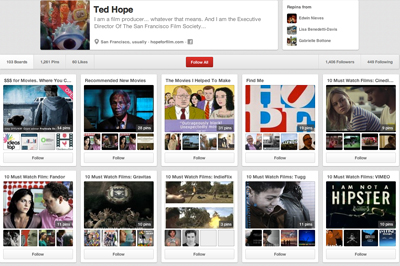Jim McKay, who once was called by Variety “America’s own Ken Loach”, responded to my recent email blast and has kindly agreed to go public with it:
“even the A-list auteurs’ star-filled agency-backed packages are failing to find US buyers at Cannes”???
I don’t see this as cause for alarm, I see this as cause for celebration.
I mean, look at that sentence. What could be more diametrically opposed to small, independent filmmaking than stars, agencies, and packaging?!?
The root of this whole problem goes back to the indie-fication of Hollywood and the fact that small films have found themselves competing with bigger ones for casting, financing, and, worst of all, Oscar recognition. Small films should never have had to compare themselves with these products or compete against them at festivals or in the box office. And yet this is where the “Indie Film” phenomena ultimately landed.
We must stop seeing ourselves through the lens of 1) Hollywood and 2) Indiewood. The first is a system completely outside the realm of what small filmmakers create. The second is actually a non-existent planet that for a small time differentiated itself from Hollywood but is now just a sub-folder. Many of the great American filmmaking veterans, the ones who have spent their careers making small films, exist completely outside these worlds. Rob Nilsson, Jon Jost, Nina Menkes, Victor Nunez, Yvonne Rainer…. Let’s start looking at how they do it, comparing the state of things for young filmmakers with the state of things for these makers. We’ll probably learn a little about how to create and survive and I bet things will also look a lot more rosy in comparison…..
Let the Cannes/Sundance/Tribeca house burn down.
Or let it just do whatever it’s gonna do. But I think we need to stop looking at the bigger system as something that exists in the same universe as films like the ones you listed.
The sky is not falling, the sky is opening up.
We’ve spent the last ten years eating filet mignon when rice and beans taste just as good. We’ve been flying first class instead of driving in the van with the band. No shit – steak and warm mixed nuts are lovely. It was nice while it lasted. But things have changed and we can change with them (for most of us, back to the way we always did it in the first place – much more challenging when you start becoming an old fuck like me) or we can just quit or sell out or buy in.
The fact is, now that the economy has crashed people will finally start making films for less money and with less bullshit attached and stop trying to play the Hollywood or, just as bad, Indiewood game. And in the future, just like in the past, really good films will still have a tough time getting made. And getting seen. And making their money back.
But there is one maxim that will never cease to apply: great work will ALWAYS, always find its way. It may not make a lot of money, it may call for extreme or inventive means of distribution, it will almost never be seen by the masses. But great work will continue to be seen and appreciated and maybe now more than ever, the means to spread the word about and gain access to this work is on the brink of discovery.
I know we’re saying pretty much the same thing. And I love how you’re actually doing something about it. Providing a space for people to share information, taking part in a community…. all this is great and also pretty much all we can do right now as the system makes its seismic shift. While the glass might be half empty of money, I believe it’s half full with creativity. Which strikes me as a pretty ridiculously optimistic thing for a cynical guy who hasn’t made a feature in 5 years and is coasting into middle-aged curmudgeonhood. And yet, there it is.
keep on keepin’ on.
x
Jim



